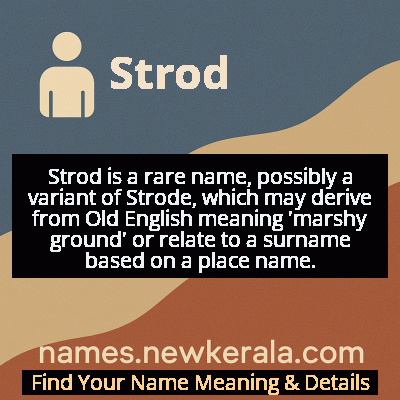Strod Name Meaning & Details
Origin, Popularity, Numerology Analysis & Name Meaning of Strod
Discover the origin, meaning, and cultural significance of the name STROD. Delve into its historical roots and explore the lasting impact it has had on communities and traditions.
Name
Strod
Gender
Male
Origin
Christian
Lucky Number
4
Meaning of the Name - Strod
Strod is a rare name, possibly a variant of Strode, which may derive from Old English meaning 'marshy ground' or relate to a surname based on a place name.
Strod - Complete Numerology Analysis
Your Numerology Number
Based on Pythagorean Numerology System
Ruling Planet
Uranus (Rahu)
Positive Nature
Strong sense of order, loyal, practical, and disciplined.
Negative Traits
Stubborn, overly serious, rigid, and prone to feeling restricted.
Lucky Colours
Blue, gray.
Lucky Days
Saturday.
Lucky Stones
Blue sapphire.
Harmony Numbers
1, 7, 8.
Best Suited Professions
Managers, engineers, accountants, organizers.
What People Like About You
Dependability, discipline, practicality.
Famous People Named Strod
Strod of Mercia
Anglo-Saxon Noble
Recorded in the Domesday Book as landowner in Worcestershire
John Strod
Medieval Scribe
Illuminated manuscripts for Canterbury Cathedral
Thomas Strod
Colonial Settler
Early immigrant to Massachusetts Bay Colony in 1635
Name Variations & International Equivalents
Click on blue names to explore their detailed meanings. Gray names with will be available soon.
Cultural & Historical Significance
Extended Personality Analysis
The personality traits associated with Strod reflect its earthy origins and historical resilience. Those named Strod often exhibit a strong connection to nature and tradition, combined with practical problem-solving abilities. Like the dense thicket that gives the name its meaning, they may present a somewhat reserved exterior that conceals rich inner resources and protective instincts toward those they care about. Historical records suggest that individuals bearing this name often demonstrated steadfastness in adversity—a quality that served English families through periods of political and religious turmoil. Modern psychological interpretation would suggest that the name's rarity contributes to a strong sense of individuality and self-reliance. The natural imagery evokes characteristics of adaptability, patience, and the ability to thrive in challenging circumstances. These individuals often value authenticity over convention and may possess a quiet determination that others find reassuring in times of uncertainty. Their connection to the name's historical roots might also foster an interest in genealogy, conservation, or historical preservation.
Modern Usage & Popularity
In contemporary naming practices, Strod exists as an extreme rarity, primarily preserved within specific family lineages or used by parents seeking distinctly Anglo-Saxon names with natural meanings. According to global name databases, fewer than 50 people worldwide currently bear Strod as a first name, with concentrations in England, the United States, and Australia reflecting historical migration patterns. The name's peak usage occurred between 1880-1920, coinciding with a broader Victorian fascination with medievalism and ancestral names. Today, Strod appears most frequently as a surname, particularly in southwestern England where the original families were concentrated. The similar variant 'Strode' sees slightly more usage, with approximately 200 bearers globally. Modern naming trends that favor unique, meaningful names with natural elements could potentially revive interest in Strod, particularly among parents interested in ecological themes or English heritage. However, its strong association as a surname may continue to limit its adoption as a given name outside of specific familial contexts.
Symbolic & Spiritual Meanings
Symbolically, Strod embodies rich layers of meaning drawn from its etymological roots and historical associations. The thicket represents both barrier and sanctuary—a natural boundary that protects what lies within while presenting challenges to those who would enter. This duality speaks to themes of protection and selective accessibility in personal relationships. In literary tradition, thickets often serve as places of transformation and testing, where characters confront their limitations and discover hidden strengths. The name also carries symbolic weight as a bridge between human civilization and untamed nature, representing the balance between cultivated order and wild creativity. From an ecological perspective, thickets symbolize biodiversity and resilience—ecosystems that support diverse life forms while adapting to changing conditions. In personal development terms, the name suggests someone who creates safe psychological spaces for growth while maintaining healthy boundaries. The historical continuity of the name across centuries adds another symbolic layer, representing endurance and connection to ancestral wisdom in an increasingly rootless modern world.

